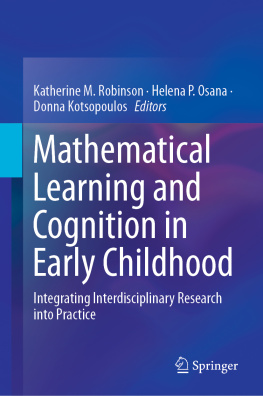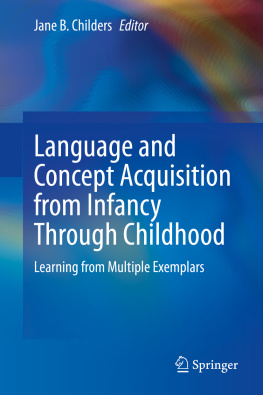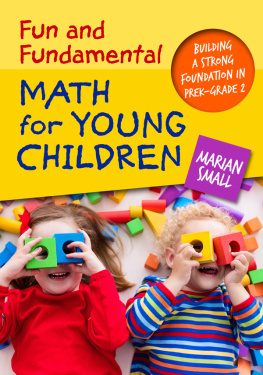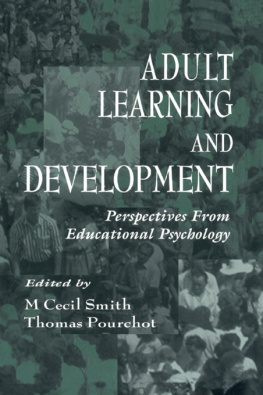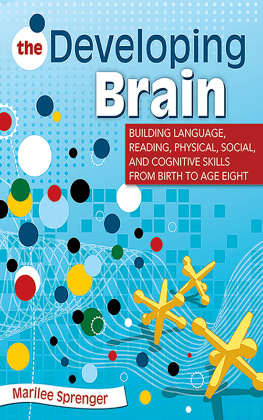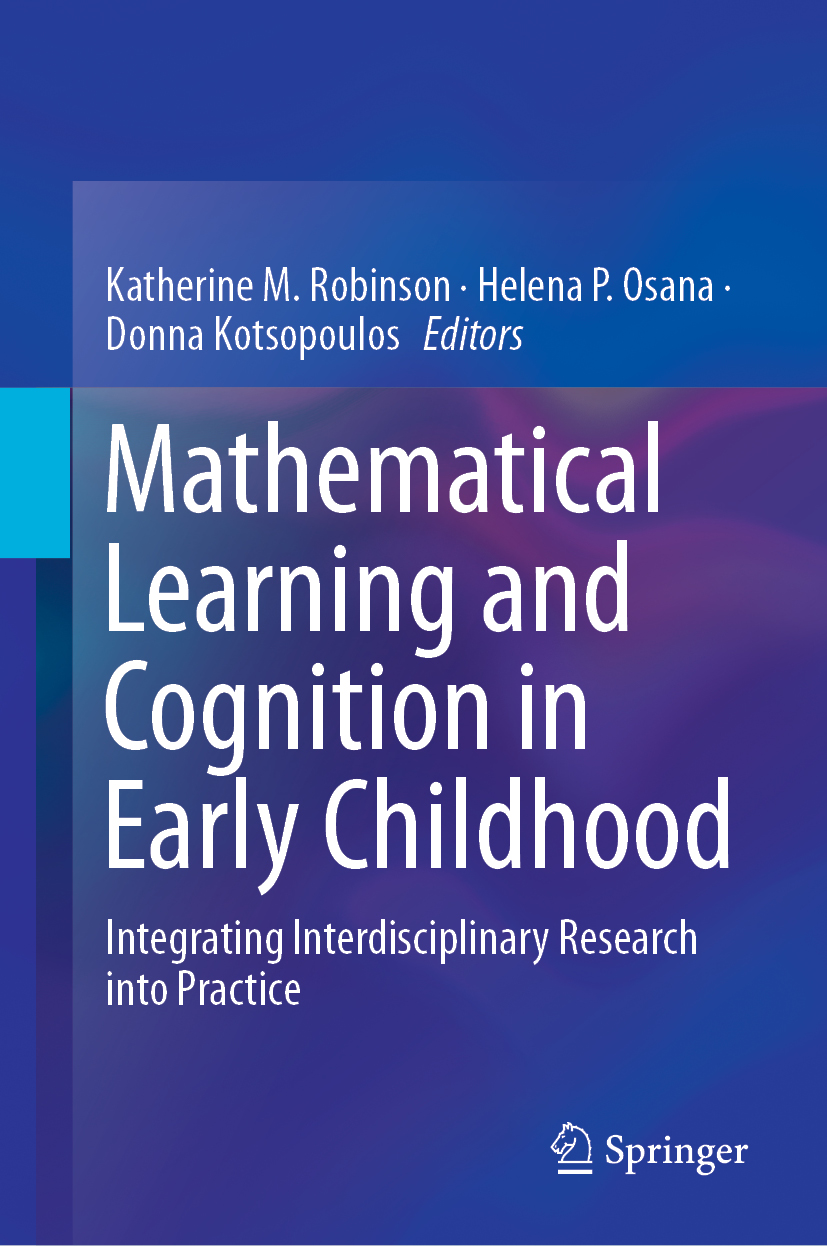Editors
Katherine M. Robinson
Department of Psychology, University of Regina, Regina, SK, Canada
Helena P. Osana
Department of Education, Concordia University, Montreal, QC, Canada
Donna Kotsopoulos
Department of Mathematics, Wilfred Laurier University, Waterloo, ON, Canada
ISBN 978-3-030-12894-4 e-ISBN 978-3-030-12895-1
https://doi.org/10.1007/978-3-030-12895-1
Library of Congress Control Number: 2019934797
Springer Nature Switzerland AG 2019
This work is subject to copyright. All rights are reserved by the Publisher, whether the whole or part of the material is concerned, specifically the rights of translation, reprinting, reuse of illustrations, recitation, broadcasting, reproduction on microfilms or in any other physical way, and transmission or information storage and retrieval, electronic adaptation, computer software, or by similar or dissimilar methodology now known or hereafter developed.
The use of general descriptive names, registered names, trademarks, service marks, etc. in this publication does not imply, even in the absence of a specific statement, that such names are exempt from the relevant protective laws and regulations and therefore free for general use.
The publisher, the authors and the editors are safe to assume that the advice and information in this book are believed to be true and accurate at the date of publication. Neither the publisher nor the authors or the editors give a warranty, expressed or implied, with respect to the material contained herein or for any errors or omissions that may have been made. The publisher remains neutral with regard to jurisdictional claims in published maps and institutional affiliations.
This Springer imprint is published by the registered company Springer Nature Switzerland AG
The registered company address is: Gewerbestrasse 11, 6330 Cham, Switzerland
Foreword
Over a decade ago, a group of researchers set out to identify the factors in early childhood development that are key predictors of school readiness (Duncan et al., 2007). By combining data from existing, large-scale, longitudinal data sets, they were able to estimate how strongly early math, early reading, early attention, and early social skills predicted later academic achievements. What came as a surprise to many at the time, and resulted in a significant public attention, was their finding that early math skills were not only a stronger predictor of later math skills, but also a robust predictor of childrens later reading. Furthermore, Duncan et al.s meta-analysis of all the reported relationships between early competencies and later skills revealed that overall, early math was the strongest predictor of later academic performance. These findings had a huge impact on the field because they brought into sharp focus the importance of early math skills and provoked greater attention to the study of how children learn mathematics from an early age. Furthermore, these results also lead to a greater level of interest in how to use evidence from research coming from a diversity of fields, including cognitive psychology, educational psychology, cognitive science, and cognitive neuroscience, to design evidence-based programs that foster mathematical skills and understanding in young children.
In the 11 years that have passed since Duncan et al.s seminal finding, many researchers with different theoretical and methodological backgrounds have focused their efforts to better characterize the mathematical minds of young children. Doing so has led to the development of approaches for the assessment and characterization of childrens early understanding of mathematics and the use of resulting knowledge to find ways to optimally foster childrens mathematical skills and understanding to set them on a trajectory of learning and growth (Bailey et al., 2017).
Now is an optimal time to take stock of what fruits this period of research and application of research has brought to bear. We have additionally obtained a better understanding of the questions that remain unanswered, the novel avenues that have emerged for research and mathematics education, and the directions that should be the focus going forward. The present edited volume entitled Early Mathematical Minds does exactly this and more. The present volume is edited by three esteemed scholars of child development and mathematics education: Katherine M. Robinson, Helena P. Osana, and Donna Kotsopoulos. These editors have brought together a well-regarded group of scholars who have contributed chapters that represent an accessible, rich, diverse, and interdisciplinary synthesis of what we currently know about the mathematical minds of young children. This volume is a must-read for those seeking a broad overview of recent advances in our understanding of what factors contribute to the successful development of young mathematical minds and how to best foster early math skills and understanding. The contributions are written in accessible language and thus are suitable for a multidisciplinary readership, ranging from educators and educational policy makers to undergraduate and graduate students as well as researchers studying the emergence of mathematical minds.
The contributions within this volume are reflective of the breadth and complexity of research on young childrens mathematical minds. By addressing such topics as spatial thinking, computational thinking, the relationship between proportional reasoning and fractions, and spatial and mathematical language spoken in the home environment, the present volume sets itself apart from related books by going beyond a sole focus on factors that influence the development of mathematical minds. The collection offers perspectives on what constitutes effective ways of screening young childrens mathematical skills and deeper understandings of how best to intervene in early development in diverse educational settings, including language immersion classrooms. Furthermore, the contributions cover important and widely debated subjects such as the role of gender in mathematics, the role played by manipulatives in early math education, and the potential of technology as a support for early math learning, both in the classroom and in the home environment. By integrating contributions that focus on the latest insights from empirical research into how children develop mathematical minds with explorations of how to best foster this development, the present volume successfully traverses the bridge between basic research on childrens early development of mathematical skills, on the one hand, and understanding the application of that research to create both formal and informal learning environments to optimally support and engage young mathematical minds on the other.
References
Bailey, D., Duncan, G. J., Odgers, C. L., & Yu, W. (2017). Persistence and fadeout in the impacts of child and adolescent interventions. Journal of Research on Educational Effectiveness , 10 , 739. https://doi.org/10.1080/19345747.2016.1232459
Duncan, G. J., Dowsett, C. J., Claessens, A., Magnuson, K., Huston, A. C., Klebanov, P., Japel, C. (2007). School readiness and later achievement.

